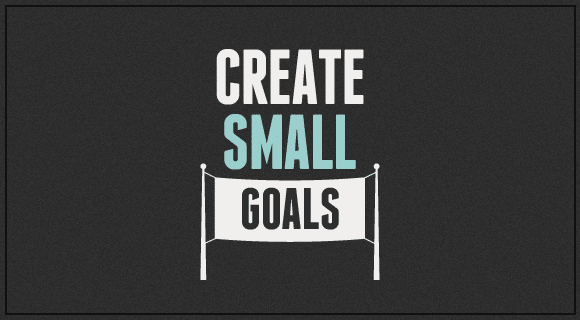
 One of the biggest problems in fitness training is discouragement. Even though people may be doing the right things to achieve their goals, they’ve made their goal way too big to achieve quickly and after a few months, find themselves discouraged and ready to quit. Rather than create a big goal that takes a long time to achieve, start with small goals so you can get success more quickly and build toward the bigger, ultimate goal.
One of the biggest problems in fitness training is discouragement. Even though people may be doing the right things to achieve their goals, they’ve made their goal way too big to achieve quickly and after a few months, find themselves discouraged and ready to quit. Rather than create a big goal that takes a long time to achieve, start with small goals so you can get success more quickly and build toward the bigger, ultimate goal.
Goal setting requires a specific goal with a specific time frame and a plan to achieve that goal.
You can still have the ultimate goal set, but you need to break it down into smaller bites. Use the SMART technique. SMART stands for Specific, Measurable, Attainable, Relevant and Time bound. Breaking that 50 pounds into 10 pound goals, and setting the time frame for a month creates a specific goal that’s relevant, measurable, attainable and has a time frame. It also creates a goal you can achieve before you become discouraged.
The goal should be exciting.
Setting a goal too short term, such as losing two pounds a week, simply isn’t as exciting as setting a goal for ten pounds a week. There’s also another reason for monthly goals over weekly goals. Sometimes the body plays tricks and seems to take on weight from nowhere. If you have a different type of fitness goal, such as one for strength, a weekly goal doesn’t allow for physical fluctuation of strength based on health and work load.
Smaller goals are stair steps to achieve the ultimate fitness goal.
You’re not going to run a marathon after working out for a month if your only previous marathon was marathon watching the first season of “Game of Thrones.” Neither will you lose fifty pounds in a month. That doesn’t mean you can’t set them as long term goals. Everyone needs an ultimate goal to strive toward with short term goals leading the way.
- Don’t expect the first few weeks of working out will be smooth as silk. Everyone feels a little awkward and intimidated initially.
- Once you achieve your fitness goals, you’ll start to realize you can do anything as long as you have a goal and a plan to achieve that goal.
- You need to make sure you know your starting point, which is one reason trainers take so long finding your present fitness level. Even Mapquest won’t give you directions if you only input your ultimate destination but not your starting point.
- Short term, smaller goals are important because they help people identify where they need to make changes in their plan to achieve them before too much time elapses.
